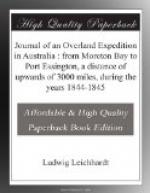As our tea bag was getting very low, and as I was afraid that we should have to go a long time without this most useful article, I thought it advisable to make a more saving arrangement. We had, consequently, a pot of good tea at luncheon, when we arrived at our camp tired and exhausted, and most in want of an exciting and refreshing beverage. The tea-leaves remaining in the pot, were saved and boiled up for supper, allowing a pint to each person. In the morning, we had our soup, and drank water ad libitum. Tea is unquestionably one of the most important provisions of such an expedition: sugar is of very little consequence, and I believe that one does even better without it. We have not felt the slightest inconvenience from the want of flour; and we were a long time without salt. The want of the latter, however, made us costive, and, when we began to use it again, almost every one of us had a slight attack of diarrhoea.
Our horses were still in excellent condition, and even improving; and our five bullocks also kept in good working order, although the oldest of them rather lagged behind. In choosing bullocks for such a journey, one should be particularly careful to choose young powerful beasts, about five or six years old, and not too heavy. All our old and heavy bullocks proved to be bad travellers; only one had borne the journey until now, and he was only preserved by great care and attention. During summer, the ground is so hot, and frequently so rotten, that even the feet of a dog sink deep. This heat, should there be a want of water during a long stage, and perhaps a run after game in addition, would inevitably kill a soft dog. It is, therefore, of the greatest importance to have a good traveller, with hard feet: a cross of the kangaroo dog with the bloodhound would be, perhaps, the best. He should be light, and satisfied with little food in case of scarcity; although the dried tripe of our bullocks gave ample and good food to one dog. It is necessary to carry water for them; and to a little calabash, which we obtained from the natives of the Isaacs, we have been frequently indebted for the life of Spring.
Sept. 8.—We travelled about ten miles north-west by west, to latitude 16 degrees (Unclear:)81 minutes. The first and last parts of the stage were scrubby, or covered with a dense underwood of several species of Acacia, Grevillea chrysodendrum and a species of Pultenaea with leafless compressed stem. The intervening part of our journey was through a stringy-bark forest, with sandy, and frequently rotten soil, on sandstone ridges or undulations. Some patches of stiffer soil were covered with box or with straggling apple-gum and bloodwood. In the scrub, I again observed Fusanus with pinnate leaves. Several good sized dry sandy creeks were surrounded with Pandanus. We saw a low range in form of a horse-shoe, to the westward; and a higher one beyond it in the distance. We encamped at a small river, which had just ceased




